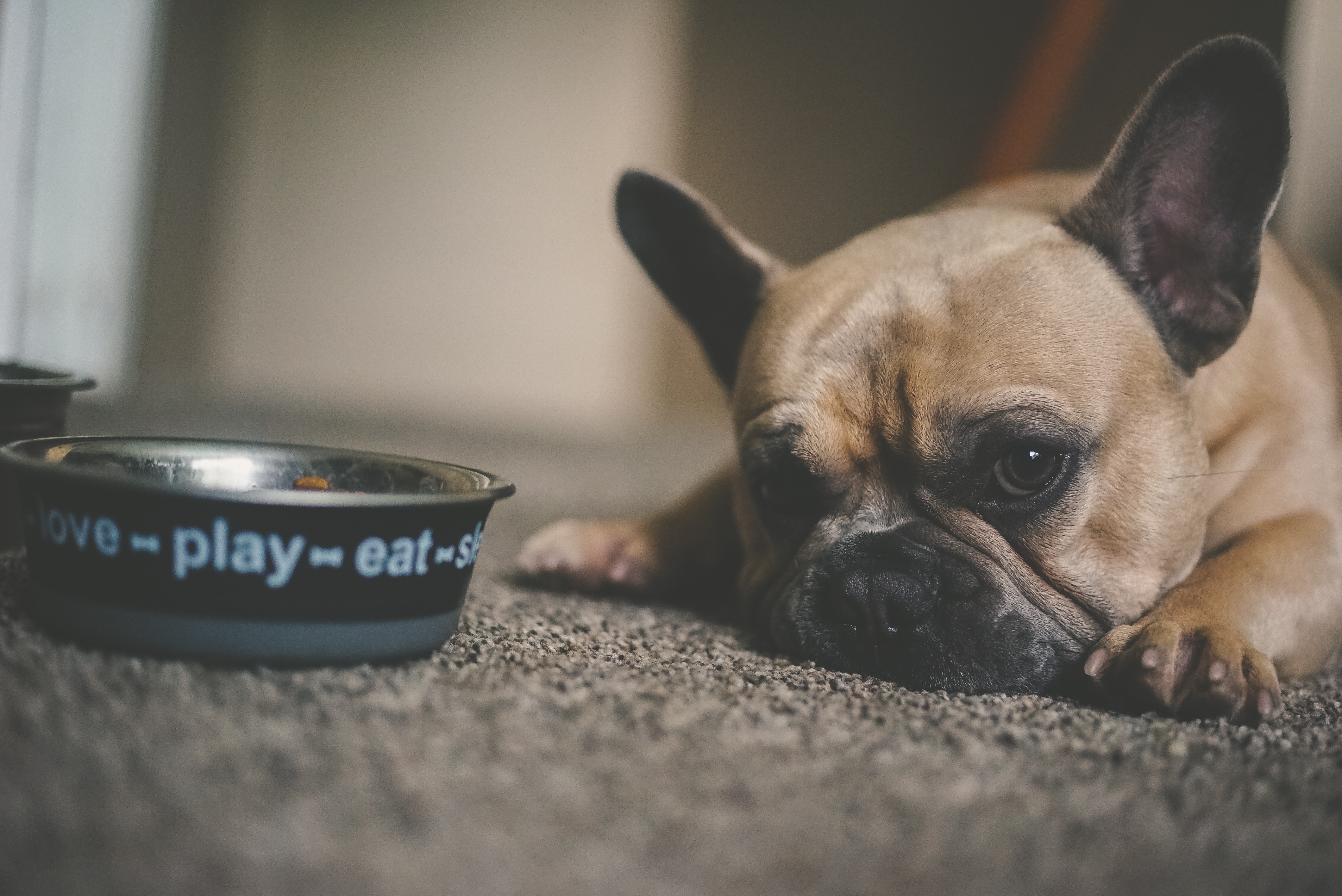It’s 8:00 at night and I’m dreading the time. Rusty, my two year old French bulldog, is fast asleep in his bed under the coffee table. His blissful slumber is interrupted by me turning him on his stomach and urging him to get up and eat. I know you’re not supposed to wake a sleeping dog but it’s dark outside and he hasn’t eaten all day. You’d never know this seeing him only an hour ago, tearing around the living room with Frankie, a bulldog twice his size and strength. They paw and nip at each other mercilessly until one or both tire out, or Rusty yelps in agony as Frankie bites down too hard on his leg.
Every now and then, Rusty will surprise me. He will be sitting up in the kitchen waiting for food at 10:00 in the morning of all things. He will eat steadily and vigorously. Well, for Rusty, vigorously means that he eats without stopping and running away every ten seconds. Once when he was about seven months old, I grew so disheartened by our daily food battle that I actually thought about giving him away. I felt terrible for even thinking it. I couldn’t bring myself to do it. I knew that I needed him more than he needed me.
It’s 8:07 now and this isn’t the first time I’ve tried to feed Rusty today. I thought he might have been hungry at 6:30. On our way in from the backyard, he passed by Frankie’s empty bowl, stopping to sniff the remnants of kibble stuck on the sides of the bowl. Rusty even came over to watch as I poured a scoop and a half of kibble into his bowl. And this so-called bowl is not really a bowl either. It’s a silicone mat with a concave centre. He refuses to eat from a bowl.
He is sitting up now. He’s going to eat. I’m sure of it. As I lay the bowl down, he tilts forward shifting his weight without moving his legs. And just as he starts pushing up on his hind legs, he darts past the bowl, lays down on his side, and goes to sleep. I wait ten minutes and then put his bowl away in a drawer. He stands up rushing over to sniff the ground. Against my better judgment I pull the bowl back out of the drawer, placing it in front of him. He turns his head away and lays back down. This is our daily dance which feels more like a battle.
Rusty is a couple pounds shy of the predicted weight for his age and breed. But he doesn’t look thin or underweight. When he was born, he was a few days premature and was a terrible at nursing I’m told. Solid foods were a struggle as well. I remember seeing a video of him at around six weeks of age. It’s feeding time and his litter mates are sleeping off food comas and he’s standing there alone in front of a feeder with the compartment closest to him filled with food. He has this look of defeat as he sits there barely chewing his food. What’s more, he seems undisturbed as morsels of food slip out from the sides of his mouth, never bothering to retrieve them.
At his first check-up, I spoke to our veterinarian about Rusty’s eating troubles. After ruling out any medical issues that could be affecting his appetite, our vet looked at Rusty and said “people put too much emphasis on food when it comes to dogs.”
I was surprised by his statement especially considering that our previous dog, Dally, had been in his care for over seven years. During this time we had walked a delicate balance between appeasing a dog who was seemingly insatiable and doing our best to keep his weight under control.
Dally didn’t look like the typical bulldog, heavy-set with a distinctive waddle. Only once in his life did he stray momentarily from his tall and muscular physique. And why—because I was feeding him endless treats in my misguided attempt to compensate for being at work all day. I could barely get his bowl onto the ground before he was pushing me aside to get to his food. And then in no time, he was looking up at me as if to say “What’s next?”
And now as I return home from work, I dread the moments that I will spend trying to coax a dog who has little interest in food. Seeing the expression on Rusty’s face brings me back to that video of him as a puppy barely leaning over to munch on kibble that his littermates had happily devoured only moments ago. I realize that his look of defeat is the same one I wear when I’m getting ready to feed him.
Many people encounter the opposite situation, leading to the overfeeding and overindulging of dogs. Why then should I be fraught with anxiety at Rusty’s apparent lack of interest in food? I could chalk it up to him just being a picky eater. I could be grateful that he’s not continually obsessing over his next meal. Or I could take solace in the fact that he hasn’t joined the ranks of North America’s rotund pet population. I guess it goes back to my relationship with Dally, a bulldog who lived to the age of eleven and a half.
After suffering a massive seizure, Dally lay weakened, his ribs and bones protruding through his skin and coat, flecked with white where red brindle hairs used to be. Even minutes before his passing, Dally lifted his head, straining to eat one last time. He hadn’t been able to stand in days and I spoon-fed him one of his favourites, black eyed peas. He ate every spoonful with such peacefulness and gratitude. I can still remember the feeling of him gripping the metal spoon with each bite. These are the moments I cling to and can never get back.
For better or worse, food is how many of us communicate love. It’s easy to give to animals. Our bond with them is unburdened by the tensions and obligations that we experience in our interpersonal relationships. And yet, we do expect much of these canine companions who can push us to our limits of love and patience.
Here’s hoping that I’ll have better luck tomorrow.
Originally published at potatosoupjournal.com on February 14, 2020



